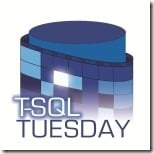This month’s T-SQL Tuesday (hosted by Kenneth Fisher – @sqlstudent144) is about security This hasn’t been my area of expertise for a long time, although I did write a long TechNet Magazine article about common security issues and solutions back in 2009.
There’s a huge amount that’s been written about implementing security in SQL Server and Windows – working towards the security of the data while it’s in the database, being sent to the client application, and within the client application. This can be incredibly important for your business and your clients and so the focus there is justifiable.
However, I think there’s an aspect to data security that’s often completely overlooked: physical security.
Consider the infrastructure in your environment, and ask yourself the following questions:
- Are the servers running SQL Server physically secured so only authorized people have access to them? I’m not just talking about whether someone can walk out with a server under their arm (and then get the hard drives with the data on – the actual server hardware isn’t a physical security risk if there is no data storage in it), although this is something you should consider. I also want you to consider whether an unauthorized person can walk up to such a server and insert a USB drive that could have an auto-run program on it that installs some kind of security hole.
- And what about if the server has server-local storage? An unauthorized person could grab a hard drive from a server and clone it really quickly, maybe overnight so no-one’s available onsite to see why the server went down. Here‘s a link on Amazon to a machine we use for quickly cloning laptop hard drives when we upgrade them. Really useful, but also useful in the hands of someone with nefarious aims.
- Are the storage arrays where the data resides physically secured so only authorized people have access to them? And what about the routers? Here is a thread from the Dell support forums about making an MD3000i password reset cable from scratch. You don’t want someone to be able to physically reset the password on some storage array, and then make a connection to it from an unauthorized server on the network and gain access to the data on the drives. And then there’s the question of someone just popping out some of the drives and walking away with them…
- Are there cameras monitoring all of the above?
- For the questions above, now ask them about your failover data center. And what if you data center is hosted? Does the hoster guarantee physical security of your data?
- Now let’s think about your admin users. What kind of physical security protects the desktops of the people with secure access to the data? Is it possible for them to walk away and leave their screen unlocked? Is it possible for someone to walk up to their computer and plug in a USB drive with some auto-run software on it?
- Now let’s think about your admin users’ laptops. Same questions as above. What about if they take their laptops home? Or they use their own systems at home? Are they physically secured so someone can’t access your data from these people’s systems?
Still think your data is secure?


4 thoughts on “Physical security”
I would imagine that in today’s world the physical security of the data is easily overlooked by many. This topic reminds me of a story that I read a few years back about a data center manager that was undergoing an audit and doing extremely well until he broke for lunch. As he left, he made absolutely certain that he properly locked all doors to the data center, but while he was at lunch, the auditor commandeered a step ladder, removed a few ceiling tiles from the drop ceiling, scaled the wall and was sitting in the data center documenting the violation when the manager returned. Talk about a bad day at the office…